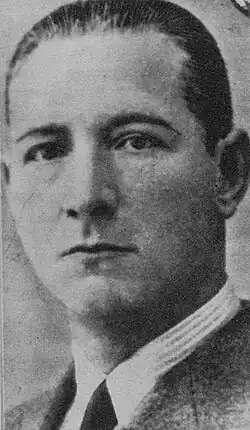Louis Lyon
Louis Lyon | |
|---|---|
 | |
| Birth name | Louis-Théodore Lion |
| Born | c. 1888 |
| Died | ? |
| Branch | |
| Battles / wars | |
| Awards | Legion of Honor |
| Spouse(s) | Françoise Cazenave |
| Relations | Mistress: Miss Thomas, his secretary |
Louis-Théodore Lyon (or Lion) was a prominent member of the Parisian social elite, gangster, and drug dealer in Interwar France. During World War I, he worked secret missions for the Deuxième Bureau.[1] During the period of conflict, he was heavily involved in running guns for the French military, where he encountered many of the people he would eventually go into business with in narcotics, including Joseph Raskin, David Gourvedis, Carlos Fernández Bácula, and Elias Eliopoulos.
History
During World War I, Lyon undertook covert operations for the Deuxième Bureau, the French military intelligence agency. Throughout the conflict, he was extensively involved in arms trafficking on behalf of the French military.
After the war, he came to be called the "Roi de la Droga" (Kingpin of Drugs).[2][3] He sold and trafficked over dozens of tons of drugs annually for the Drug Barons of Europe, a group of brothers led by Elias Eliopoulos.[4] His activities were unknown to others, who were convinced that he was a gourmet restaurateur.[5] His restaurant, located at 39 rue Boissy d'Anglas, was incredibly popular among the socialite classes.[6] The network of the Drug Barons of Europe is considered by historians to be the predecessor of the French Connection. However, in 1935, a heroin processing factory at 220 Rue du Faubourg Saint-Honoré, owned by Lyon, exploded, igniting a drug war between himself and the Eliopoulos brothers, as well as a series of investigations and arrests around the world.[7] His arrest and trials in 1938 and 1940 were covered in nearly every major Parisian newspaper. The first arrest in 1938 was unsuccessful because he had paid off most of the Parisian police in his sector.[7] His lawyer, Lionel de Tastes, was later arrested and charged for his own involvement in the drug ring.
The newspaper Paris-soir writes:
"Louis Lyon is, moreover, a very strange figure in this milieu. Rich in millions, he led a peaceful existence in a bourgeois apartment on Rue de la Pompe. Never in name only in a "delicate affair," while for many he presides only over the destiny of a very Parisian restaurant, for those in the know, in the shadows, he presides over the drug trade throughout the 'Butte.' "[1]
The newspaper L'Illustration Nouvelle writes:
"Among the discoveries made by the police, this one should be mentioned. The restaurateur Lyon owned a chemical factory for the transformation of opium leaves into cocaine and heroin, on the border between Bulgaria and Yugoslavia. Every time a police raid was ordered in Bulgaria, on the Lyon factory, the narcotics were transported to the part of the factory located in Yugoslavia and vice versa. In this way, the authorities were fooled for a very long time."[8]
His 1940 sentencing, which had been scheduled for two years, was quickly interrupted by the German invasion of France. During World War II, he worked secret missions for the French Resistance. He killed Nazis. He killed Mafia members. He killed Paul Carbone by organizing a mission to derail the train that Carbone was riding on, and also killed several of his other former associates who had allied themselves with the Nazis and German intelligence.[9] He earned the Legion of Honor. It is currently unknown how much Lyon was involved with Operation Underworld, but one of his close confederates was August Del Gracio, who initially organized the operation with the Federal Bureau of Narcotics (FBN).
Harry Anslinger writes:
"Lyon however, redeemed himself with the French people and government by services rendered in the battle against Hitler. Just before World War II he uncovered an arms cache of the Cagoulard organization, the Nazi-type group seeking to do to France what Hitler had done to Germany. Later, during the war itself, Lyon kept the French Underground informed on the activities of German spies pretending to be anti-Nazis and seeking to infiltrate the Underground itself. As a result many of these spies were apprehended by the Underground and summarily dealt with. Following the war, the French government awarded ex-gambler, ex-bookmaker, ex-dope dealer Lyon the Legion of Honor."[10]
References
- ^ a b "Théodore Lion, chute d'un " caïd " du trafic d'héroïne parisien". RetroNews (in French). Retrieved 2025-07-28.
- ^ Montarron, Marcel (July 20, 1939). "LE "ROI DE LA DROGA"" (PDF). criminocorpus. Détective. p. 13.
- ^ Millot, Théo (2015-05-16). "La drogue et ses réseaux dans l'Europe occidentale des années 1930". Le Taurillon (in French). Retrieved 2025-07-28.
- ^ Artois, Philippe (July 3, 1938). "Le roman de la Drogue" (PDF). criminocorpus. Police Magazine. p. 12.
- ^ Montarron, Marcel (June 15, 1939). "L'Affair Lyon" (PDF). criminocorpus. Détective.
- ^ "Quand Gressy défrayait la chronique de la lutte contre la drogue". Société d'Histoire de Claye et de ses environs (in French). Retrieved 2025-07-28.
- ^ a b Marshall, Jonathan (2012-05-16), "2. The French Connection", The Lebanese Connection, Stanford University Press, pp. 33–48, doi:10.1515/9780804782562-003, ISBN 978-0-8047-8256-2, retrieved 2025-07-28
- ^ "L'Illustration Nouvelle". numerique.banq.qc.ca (in French). July 5, 1938. p. 2. Retrieved 2025-07-29.
- ^ Valentine, Douglas (2004). Strength of the Wolf. Versus.
- ^ Harry J. Anslinger and Will Oursler (1961). The murderers. Internet Archive.